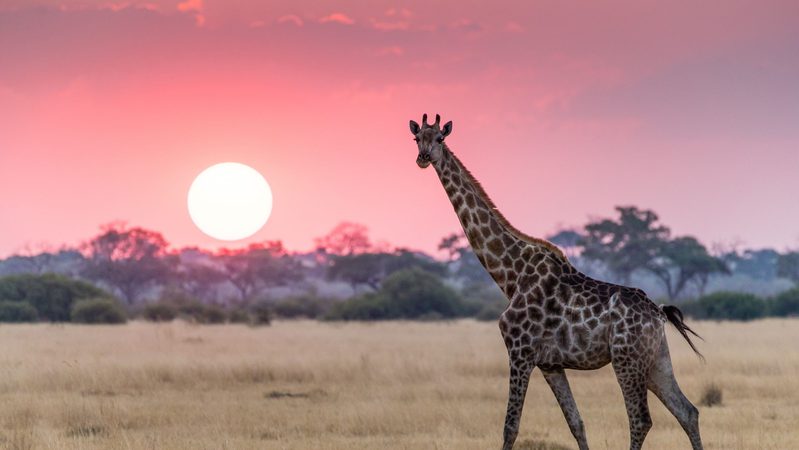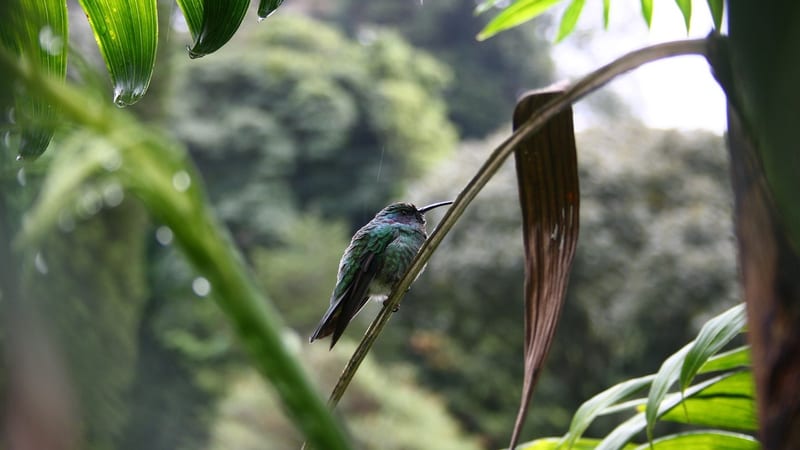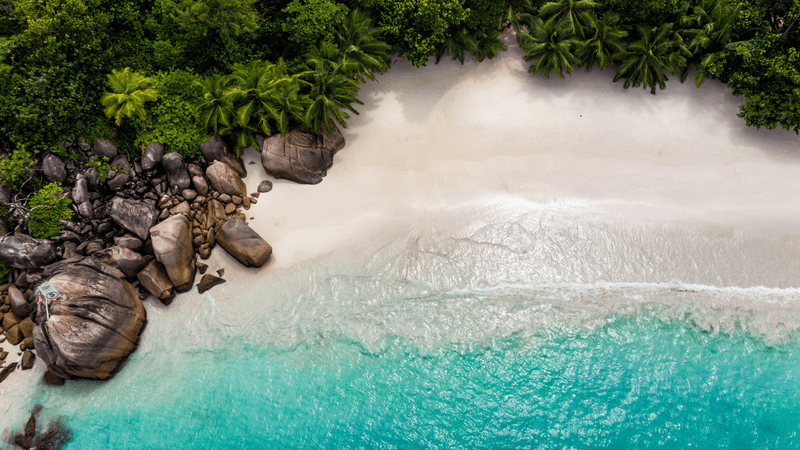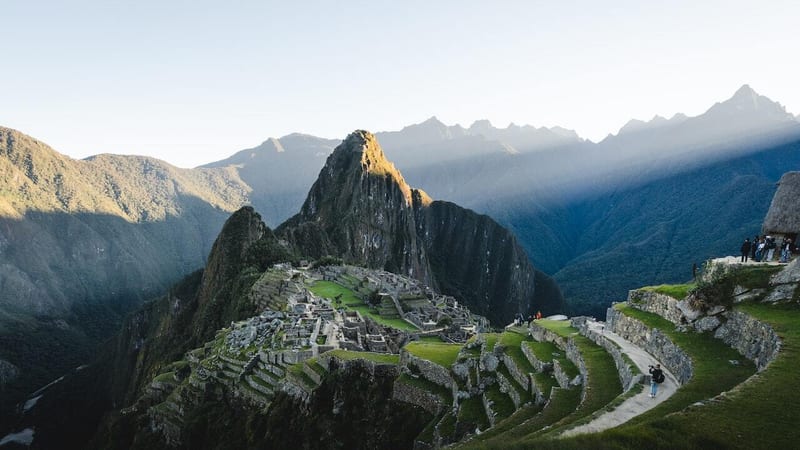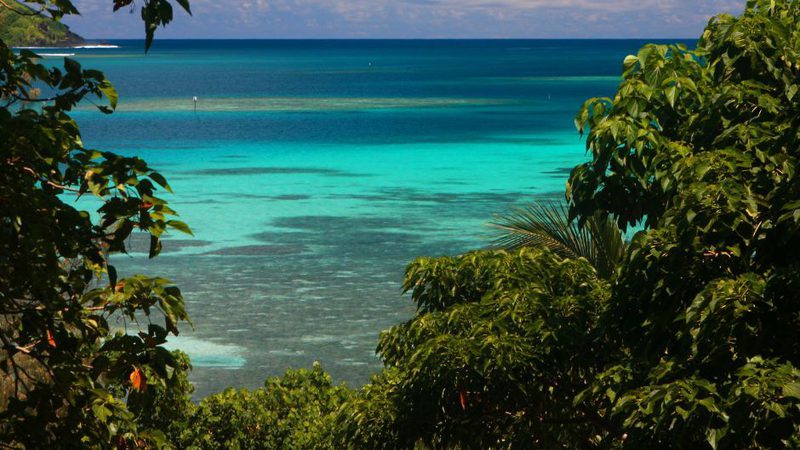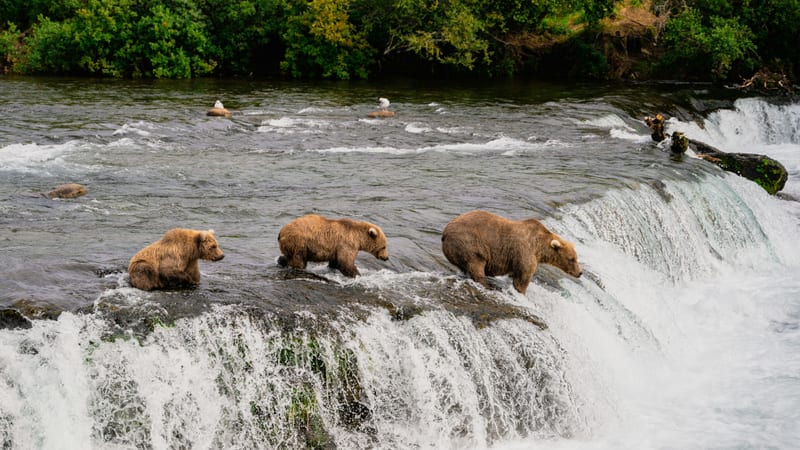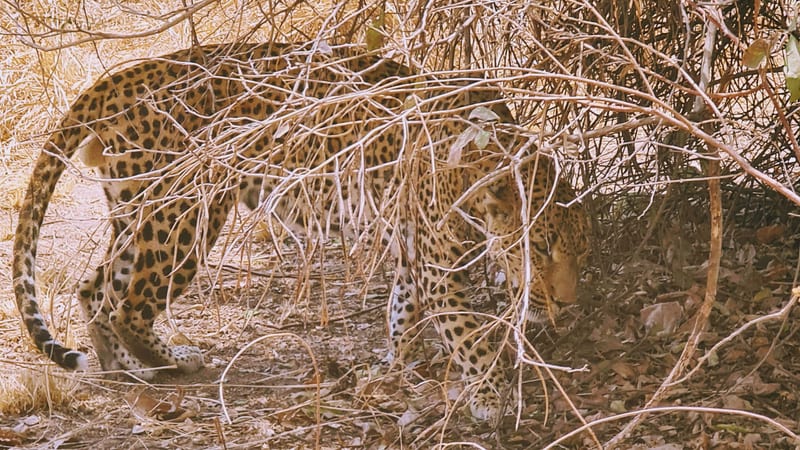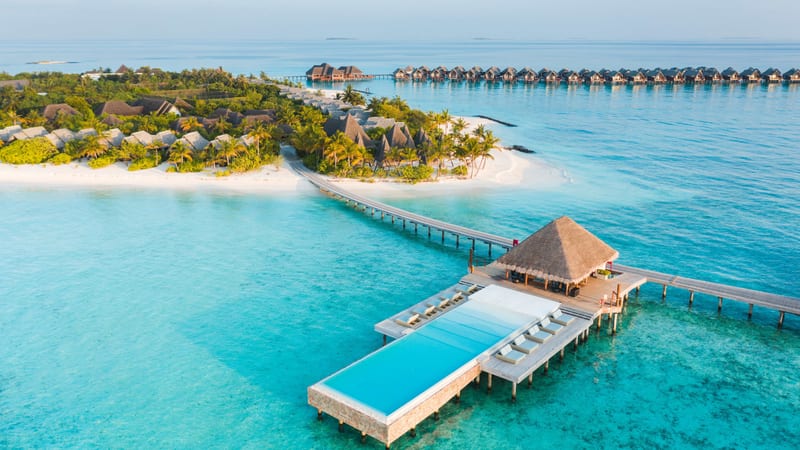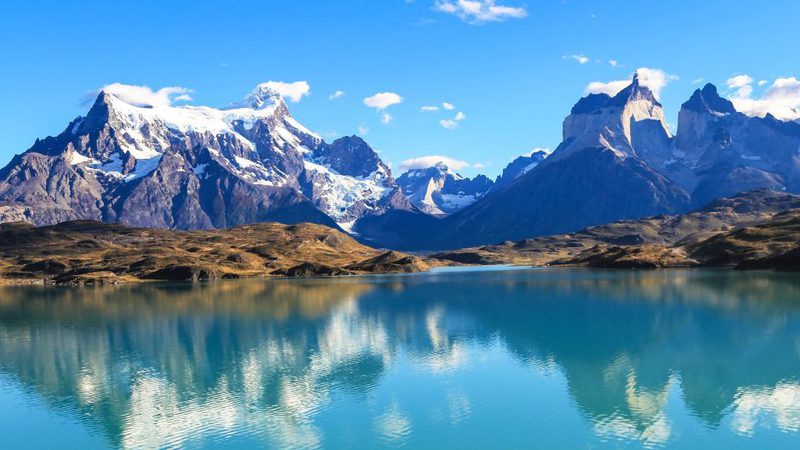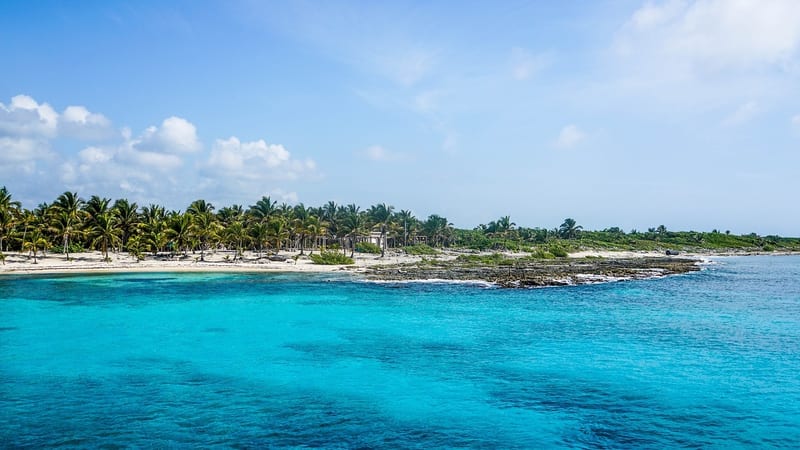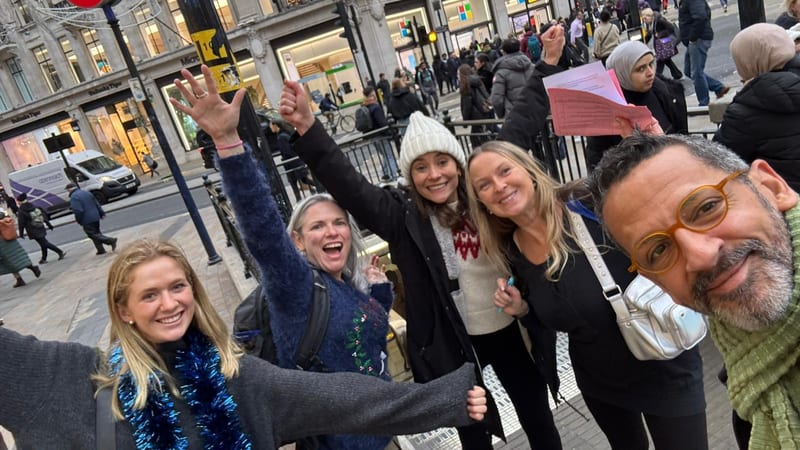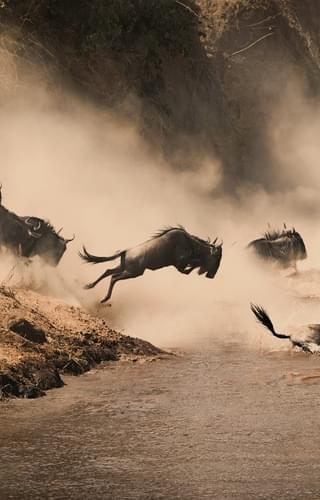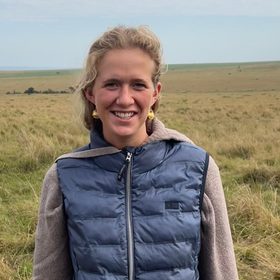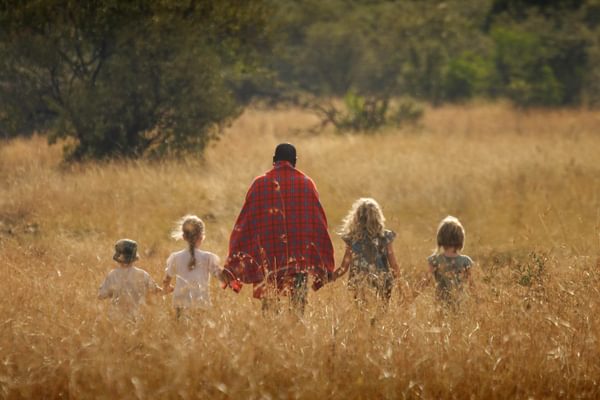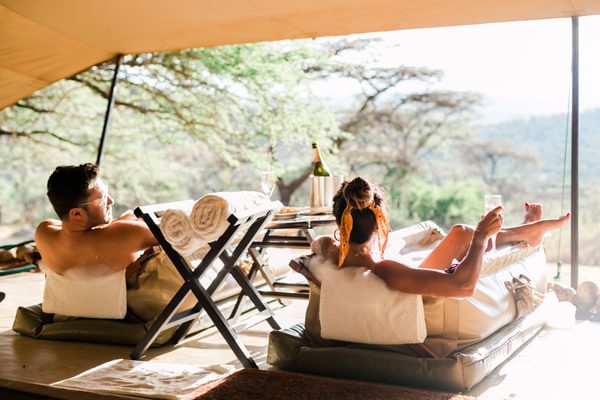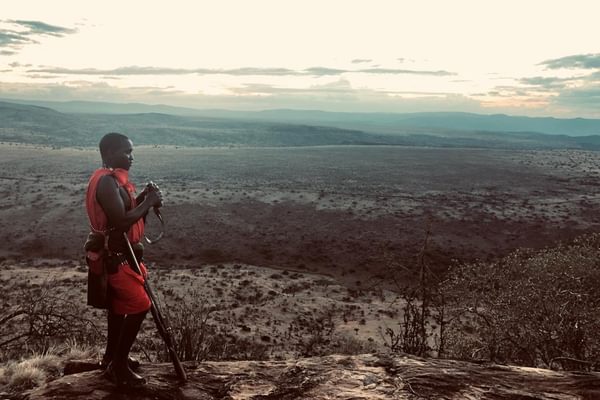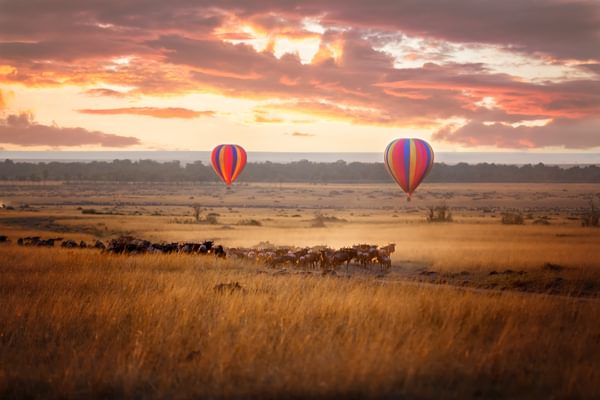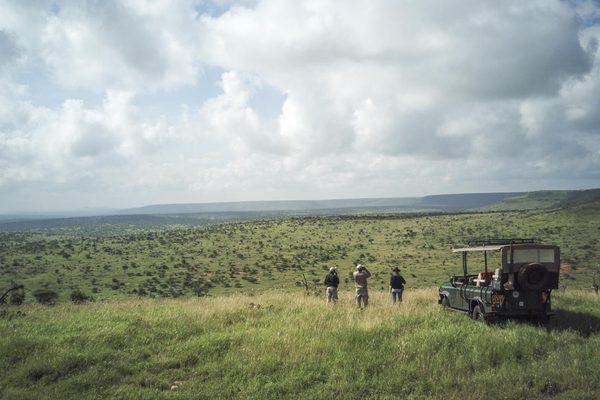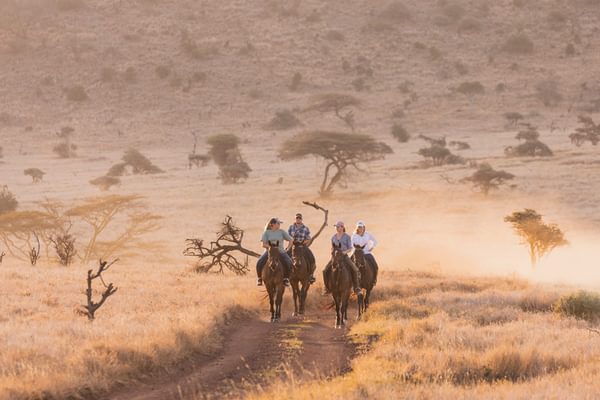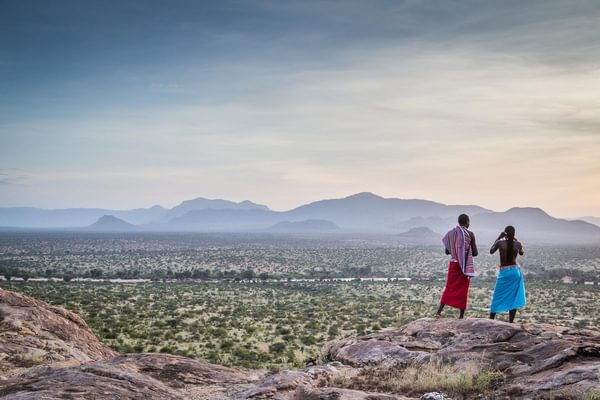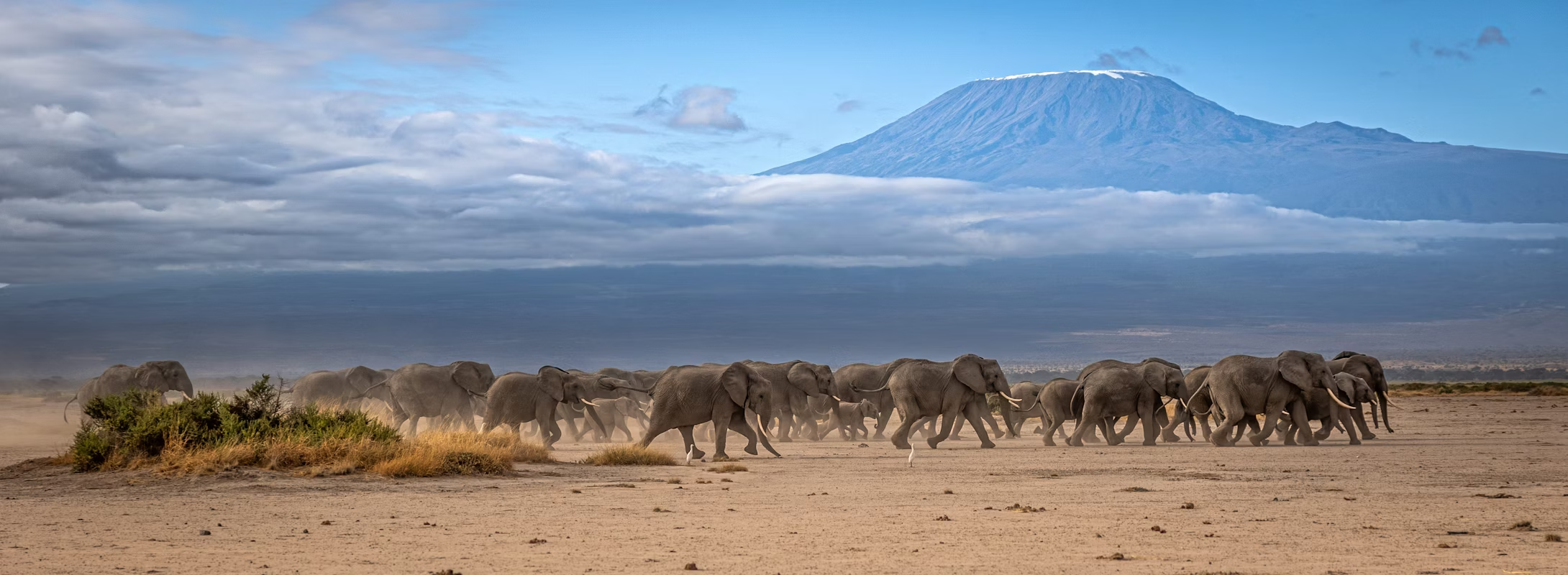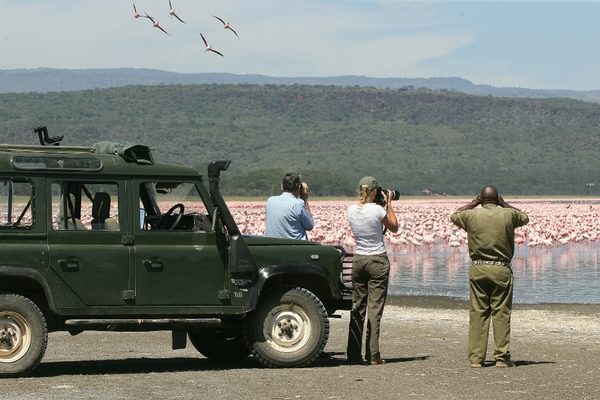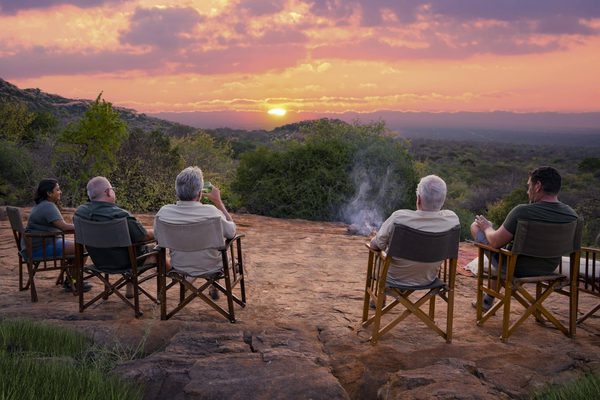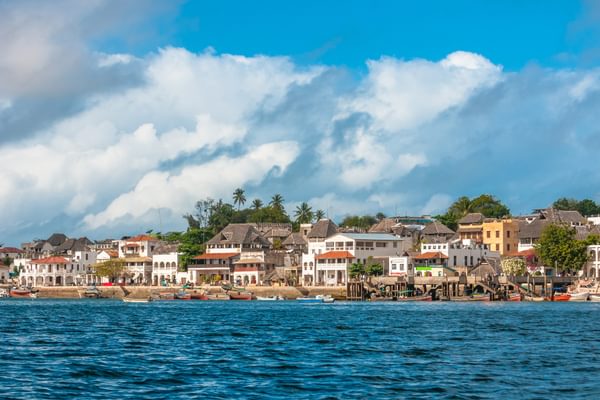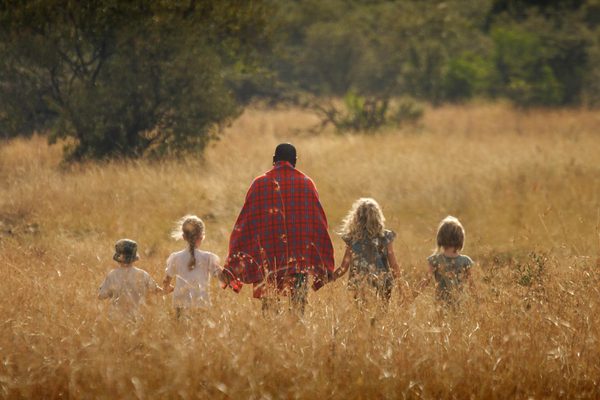The home of the safari
Go beyond the Big Five with expert-guided safaris across Kenya. From the Masai Mara to Amboseli, let us help you discover the best of Kenya
If it’s wildlife you’re after, Kenya is one of the best places on Earth to see animals in their natural habitat. With over 50 National Parks and Reserves, each with something unique to offer, there’s no shortage of opportunities for unforgettable encounters.
Our Kenya holiday recommendations
The Masai Mara is Kenya’s most iconic park, and with good reason. Between July and October, the Great Migration rolls in and vast herds of wildebeest and zebra flood the plains, closely followed by lions, cheetahs and other predators. It’s nature at its most dramatic and incredibly moving to witness.
However, we always recommend visiting at least two safari regions – Kenya’s landscapes are so varied, and each brings its own atmosphere, wildlife and rewards.
If you love elephants, Amboseli is hard to beat, famous for its herds wandering majestically beneath the towering Mount Kilimanjaro. If rhinos are on your list, Lewa offers a strong conservation record and excellent chances of sightings. Bird lovers are drawn to the Rift Valley lakes, where thousands of pink flamingos gather and over 450 species have been recorded.
Alternative Kenya holiday ideas
For something a little different, head north to Samburu, where you'll have the chance to spot rare species like the Grevy’s zebra, gerenuk and Somali ostrich. It’s also one of the few places where you can go on camel treks through the bush.
Beyond the wildlife you'll find the people and culture just as special. Many guides come from local communities, including the Maasai and Samburu, and share not just deep knowledge of the land and animals, but also their traditions and stories. You can visit villages for a glimpse of everyday life, and if you’re travelling as a family, children especially love the chance to try ‘warrior skills’ – learning to track animals, make fire, and even identify different droppings (which always gets a giggle).
Clients often ask us about the difference between national parks and private conservancies. In short: the wildlife is the same, but the experience is different. For those wanting a more private experience, Kenya’s conservancies are a great alternative to the national parks. Places like Mara North and Naboisho border the Masai Mara and offer the same amazing wildlife, but with fewer vehicles, more freedom to explore, and a real sense of exclusivity.
Kenya holiday add-ons
And after all that adventure, Kenya’s Indian Ocean beaches are just a short flight away and the perfect place to relax. Expect white sands, turquoise seas, swaying palms, and, if you're still feeling active, some of the best diving and snorkelling in East Africa. Whether it’s Watamu, Diani, Lamu or Kilifi, you’ll find a beach to suit your mood - and a hammock to match.

Kenya Safari and Zanzibar Beach Holiday
- Nairobi
- Masai Mara
- Stone Town
- Zanzibar beaches
From Skybeds to Spice Islands – a journey that pairs the thrill of safari with the soulful calm of the sea. A striking contrast, and an unforgettable passage through two of Africa’s most iconic landscapes.
Kenya Trip Inspiration
When to go to Kenya
Find out the best time to visit Kenya with our month by month guide.
- Best
- Good
- Mixed
- Jan
- Feb
- Mar
- Apr
- May
- Jun
- Jul
- Aug
- Sep
- Oct
- Nov
- Dec
January
January is a great time for wildlife viewing. The landscapes are lush and green after the 'short rains' and newborn animals can been seen. It is hot, but brief afternoon or evening showers cool things down, without compromising your safari. Over on the coast the sea is clear, making it ideal for diving and snorkelling, and the days are warm and bright.
February
February is an ideal time to visit Kenya, and great for game viewing. The landscapes are green and thriving thanks to the short rains, and newborn animals will be hopping around the plains. There maybe a few afternoon showers which are welcome in the heat, and don't impact on wildlife viewing. Water clarify is excellent at the moment, which is good news for watersports enthusiasts. And if you want to spot a whale shark, now is the time to try.
March
Still a good option for wildlife viewing and diving, although with the 'long rains' just around the corner, expect wetter and hotter weather.
April
April brings the start of the 'long rains' which means game reserves and national parks become muddy and harder to drive around. Over on the coast it's hot and wet, so it isn't the best time of year to travel. Some camps and lodges close during this period.
May
The 'long rains' continue into May, making park tracks difficult to navigate in the mud, and the coast very warm and wet. There will be less accommodation choice at this time as several lodges and camps during this period.
June
June is a beautiful time of year to visit Kenya, with the rains receding to just light showers, and the long dry season not far ahead. The high grasses can sometimes make it more of a challenge to spot game, but the landscapes are lush and some animals may begin arriving early for the migration. At altitude nights can be cool, but elsewhere the temperature is pleasant.
July
July marks the beginning of the great migration into the Masai Mara, and with warm and generally dry weather, this is a great time of year to visit. Days are sunny, skies are blue and there isn't too much dust around, so it's a great time for photography.
August
The migration is now in full swing in the Masai Mara, with lots of river crossing action, so if you want to see those massive herds of wildebeest and zebra, now is the time to come. Game viewing in general is excellent and it's one of the most popular times of year to visit, so some of the main parks do become crowded. Temperatures are warm and dry.
September
Game viewing continues to be excellent, and the weather is generally dry so this is another ideal month to visit Kenya's parks. The bush is less dense and as animals gather around waterholes and rivers it makes wildlife spotting much easier.
October
October is a great time if you want to avoid the crowds and don't mind the temperature slowly starting to rise. There may be a few short showers, but game viewing remains excellent with the end of the migration, and it's a good time to holiday anywhere in Kenya.
November
November heralds the start of the 'short rains' and with hotter temperatures some camps are closed. The Mara however is still open, and despite sometimes stormy skies, game viewing is still good. Fewer crowds and lower prices make this an attractive month to visit. Over on the coast water clarify is good for snorkelling and diving.
December
The 'short rains' are bringing the landscapes back to life, and as the plains start to become green again, wildlife viewing remains good, and it's a great time for birding. Some camps are closed (mainly in the north of Kenya) but many others remain open. The showers tend to fall in the afternoons and don't impact greatly on a safari. Take advantage of reduced visitor numbers and lower prices.

Ottilie, one of our Kenya specialists, says:
“Kenya is the kind of place that works for just about everyone – whether it’s your first safari or your fifth, it really ticks all the boxes. And the game drives are incredible, but there’s so much more to experience. One day you might be drifting over the Mara in a hot air balloon, the next riding alongside giraffes in Lewa or walking with fascinating Samburu guides who know every track and sound. And if you want something really different, sleep out in a fly camp – just you, a mosquito net, and the sounds of the bush. Whatever kind of adventure you're after, Kenya has it, and it also has incredible paradise beaches for the ultimate holiday!"
Types of Kenya holidays
Where to go in Kenya
Top places to visit in Kenya
Best places to stay in Kenya
Read more about Kenya on our blog
Speak to a Kenya expert today
and start planning your tailor-made holiday

Alistair

Ottilie

Tamara
FAQs About Your Kenya Holiday
Planning a holiday to Kenya? Our experts share advice on everything from what to pack, when to go, to tips for families, covering the questions we get asked the most.
Is Kenya good for a safari holiday?
Kenya is one of the best safari destinations in the world. With the Big Five, iconic parks like the Masai Mara and Amboseli, and exclusive experiences in Laikipia’s private conservancies, it offers incredible variety. From luxury camps and walking safaris to fly-in adventures, Kenya safari holidays suit both first-time and seasoned travellers
When is the best time to go on a Kenya safari?
The best time to visit Kenya for a safari holiday is in the dry season, from June to October. Wildlife is easier to spot as animals gather around water sources, and the bush is less dense. For the Great Migration in the Masai Mara, aim for July to September. Kenya safari holidays in January and February are also rewarding, with clear skies and excellent wildlife activity.
How long are Kenya safari holidays?
Most Kenya safari holidays last between 7 and 14 days. A week is enough to visit two key safari areas, while a longer trip lets you explore at a slower pace or add time on the coast. We create tailor-made Kenya itineraries to suit your travel style, whether you're planning a short luxury escape or a longer family adventure.
What animals can I see on a Kenyan safari?
Kenya is home to an incredible range of wildlife. You can expect to see the Big Five (lion, elephant, buffalo, leopard, rhino), plus cheetahs, giraffes, zebras, wildebeest, hippos, and much more. The birdlife is outstanding too. Between July and October, the Great Migration brings millions of wildebeest and zebra to the Masai Mara, offering some of the most dramatic wildlife sightings on Earth.
What should I wear on a Kenya safari?
For a Kenya safari, pack lightweight, neutral-coloured clothing (like khaki, olive, or beige), along with a fleece or jacket for cooler early mornings and evenings. Comfortable walking shoes, a wide-brimmed hat, sunglasses, and sunscreen are essential. Layers are key, as temperatures can vary throughout the day. Avoid bright colours and camouflage patterns. See our helpful safari packing list.
Is Kenya a good destination for a beach holiday?
Absolutely. Kenya is a brilliant destination for a beach holiday, whether you’re looking to relax after safari or simply enjoy some time by the sea. The beaches are peaceful and unspoilt, with a choice of boutique hotels, family resorts, and romantic retreats. You’ll also find coral reefs, water sports, and cultural sites nearby – so there’s plenty to do beyond the beach if you want it.
How much do Kenya safari holidays cost?
Kenya safari holiday prices vary depending on the time of year, level of luxury, and length of stay. As a guide, a tailor-made safari can start from around £3,000 per person for a week, including mid-range lodges and internal flights. Luxury Kenya safaris can cost more, especially during peak migration season. We’ll work with your budget to plan the right trip for you.
How do I book my Kenya safari holiday?
Booking a Kenya safari with us is easy. Start by getting in touch – we’ll talk through your travel plans, interests, and budget. Then we’ll design a personalised itinerary just for you. We handle everything, from park fees and transfers to expert guides and special touches along the way.
What vaccinations do I need for Kenya?
There are no required vaccinations for travel to Kenya, but recommended vaccinations include hepatitis A, typhoid, diphtheria-tetanus-polio (DTP), and yellow fever (which is required if you’re coming from or transiting through a country with risk of yellow fever). You may also need malaria tablets. Always check with your GP or travel clinic at least six weeks before your Kenya safari holiday.
Which is better Kenya or Tanzania?
Kenya and Tanzania both offer world-class safari holidays, but the right choice depends on what you're looking for. Kenya has a broader variety of landscapes and is often better for first-time safari-goers, with iconic parks like the Masai Mara, Amboseli, and Laikipia. It’s also easier to combine a safari with a beach holiday on the Kenyan coast. Tanzania is perfect if you want to explore the Serengeti or climb Kilimanjaro.
Does Kenya have good beaches?
Yes – Kenya has some of the best beaches in East Africa. The coastline stretches along the warm Indian Ocean and is lined with white-sand beaches, swaying palms, and clear turquoise water. Popular spots like Diani, Watamu, and Lamu are known for their natural beauty, relaxed atmosphere, and excellent snorkelling and diving.
Can you go in the sea in Kenya?
Yes – the sea in Kenya is warm, swimmable, and generally safe for swimming, especially in calm areas protected by coral reefs. Beaches like Diani and Watamu have clear, shallow waters ideal for swimming, snorkelling, and paddleboarding.

